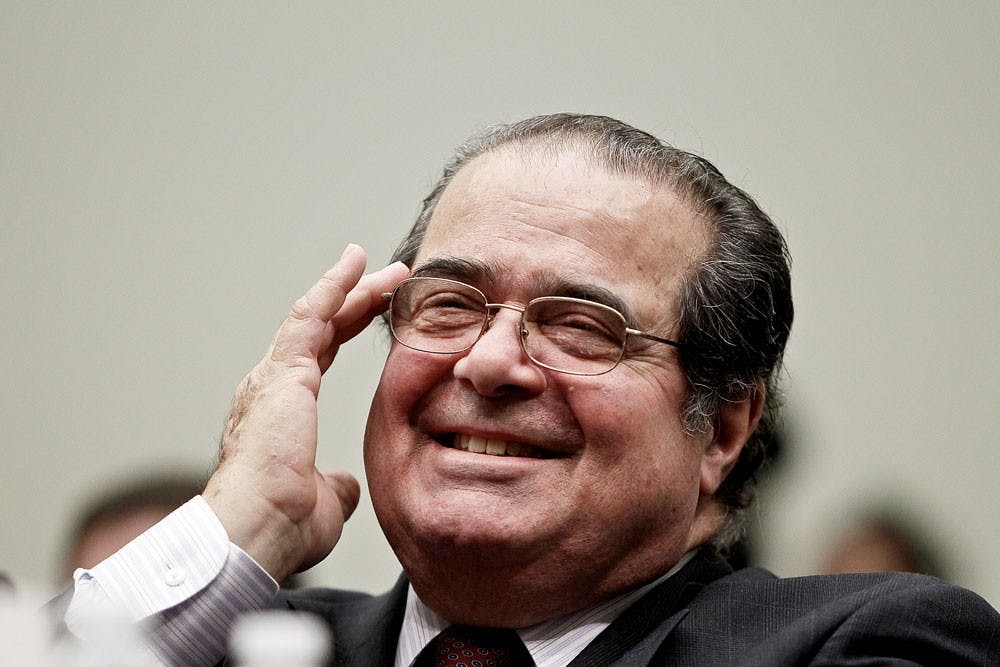The sudden death of Supreme Court Justice Antonin Scalia has left a vacant seat on the United States Supreme Court. The search for a new justice nearly immediately caused a stir among the Republican and Democratic parties.
Antonin Scalia passed away from apparent natural causes at the age of 79 at a luxury resort on Saturday in West Texas, according to the U.S. Marshals Service. Former President Ronald Reagan nominated Scalia, a longstanding member of the Supreme Court’s conservative wing, and the Senate unanimously appointed him in 1986.
His death has wide-ranging effects on all branches of government and on political players and law students across the country.
“Justice Scalia was a brilliant jurist and a forceful advocate for the doctrine of originalism in interpreting laws and the U.S. Constitution,” said James Campbell, a distinguished political science professor. “The job of the jurist was very strictly to determine whether an act was in accord with the law or the Constitution as it was meant by those who originally passed or ratified it.”
Scalia was an ardent practitioner of originalism, the concept of constitutional interpretation that looks to adhere to and incorporate the understanding and philosophies of those who drafted and ratified the Constitution.
“[Scalia’s beliefs] put him on the conservative side of the current Court, but he was not a judicial activist,” Campbell said. “He said that he followed the law to whatever conclusion it took him, whether he personally liked that conclusion or not.”
Alexis Ogra, a sophomore history major and president of UB College Republicans and Erica Lutz, a junior communication and political science major and vice president of UB College Republicans, referred to Scalia’s death as a blow.
“This is definitely a big loss for any conservative and the Court as a whole,” Ogra said. “Losing any justice is really just a hit to the nation.”
Ogra said she feels that his legacy won’t be lost and people will still remember the important role he played in decisions.
Lutz said as a student pursing law, Scalia’s opinions were always clear and easy to understand.
“I think losing his [writings] might affect how students read and look up to the law,” Lutz said. “They might be challenged if someone writes it in kind of heavy jargon.”
Campbell said, politically, the passing of Justice Scalia is a “huge loss” for American conservatives.
Article II, Section 2 of the U.S. Constitution says the President has the power and authority to "nominate, and by and with the Advice and Consent of the Senate, shall appoint... judges of the Supreme Court.”
Campbell said the Republican Senate majority is big enough to block a liberal nominee from President Obama.
“Since President Obama has not worked well with congressional Republicans in the past and has tried to circumvent congressional authority in numerous ways [such as] recess appointments, executive orders, and executive agreements rather than legislation, there is little reason for congressional Republicans to be conciliatory toward the President now and both time and numbers are on the Republican's side,” Campbell said.
The longest it has taken for the Senate to approve a president’s nomination to the Supreme Court is 107 days, when Supreme Court Justice Clarence Thomas was nominated in 1991. President Obama has over 300 days left in office.
Campbell said he thinks that the likelihood a replacement nominated by President Obama will take place before this year’s presidential election is “extremely unlikely.”
The process to replace Scalia began on Saturday night when the president’s legal team began making conference calls. On Sunday, meetings took place to begin drawing up a list of possible candidates, according to CNN.
The White House Office of General Counsel's office administers the process, along with a team of lawyers and aides. They gather information on each potential candidate perform specific in-depth legal research, according to CNN.
Rumors of possible candidates are in full swing, with a leading Supreme Court analyst predicting Attorney General Loretta Lynch as the frontrunner, according to NBC News. If chosen, Lynch would first black woman ever nominated to the Supreme Court.
Campbell said President Obama and the Democrats in Congress would like to nominate a replacement quickly and win confirmation in the next few months.
“Since this is an election year and the parties are already highly polarized, conservative Republicans will block this attempt by President Obama and congressional Democrats to secure a rubber stamp liberal majority on the Court,” Campbell said. “Republicans have 54 seats in the Senate to 44 for Democrats and two independents who usually vote with the Democrats.”
The Senate has rejected 36 nominations to the Court out of 160 since 1789, according to the Congressional Research Service.
Scalia famously opposed affirmative action and other policies that offered special treatment to minorities.
Campbell said the death of Justice Scalia removes a “persuasive voice” from the side of the Court that is “skeptical of affirmative action as a remedy to any remaining racial discrimination.”
He said this could mean that current policies will remain in place until the composition of the Court is brought back to nine members.
“As a group, some college-age students are helped by affirmative action and others hurt by it,” Campbell said. “It is a classic zero-sum game policy option.”
Ogra said college students should care about issues facing the government.
“Judicial review is a big part of our daily lives, it’s not just from president to president, they serve as a life term,” Ogra said. “It’s a long-lasting term and the next justice can be there as long as I live so it’s really something that people should be focused on.”
Ashley Inkumsah is the news editor and can be reached at ashley.inkumsah@ubspectrum.com





